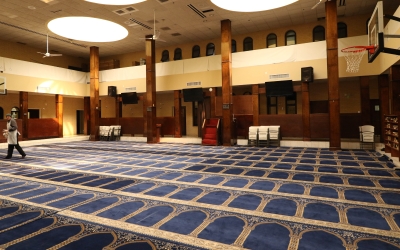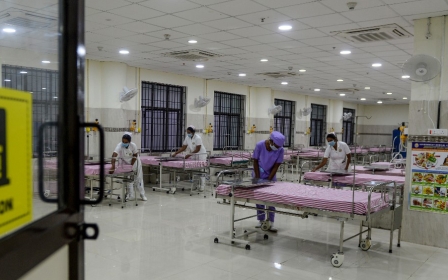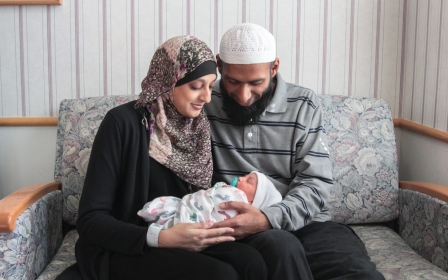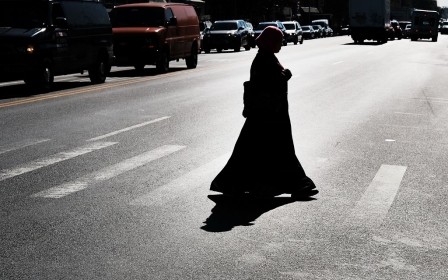Empty prayer rows and donation boxes, coronavirus hits US mosques
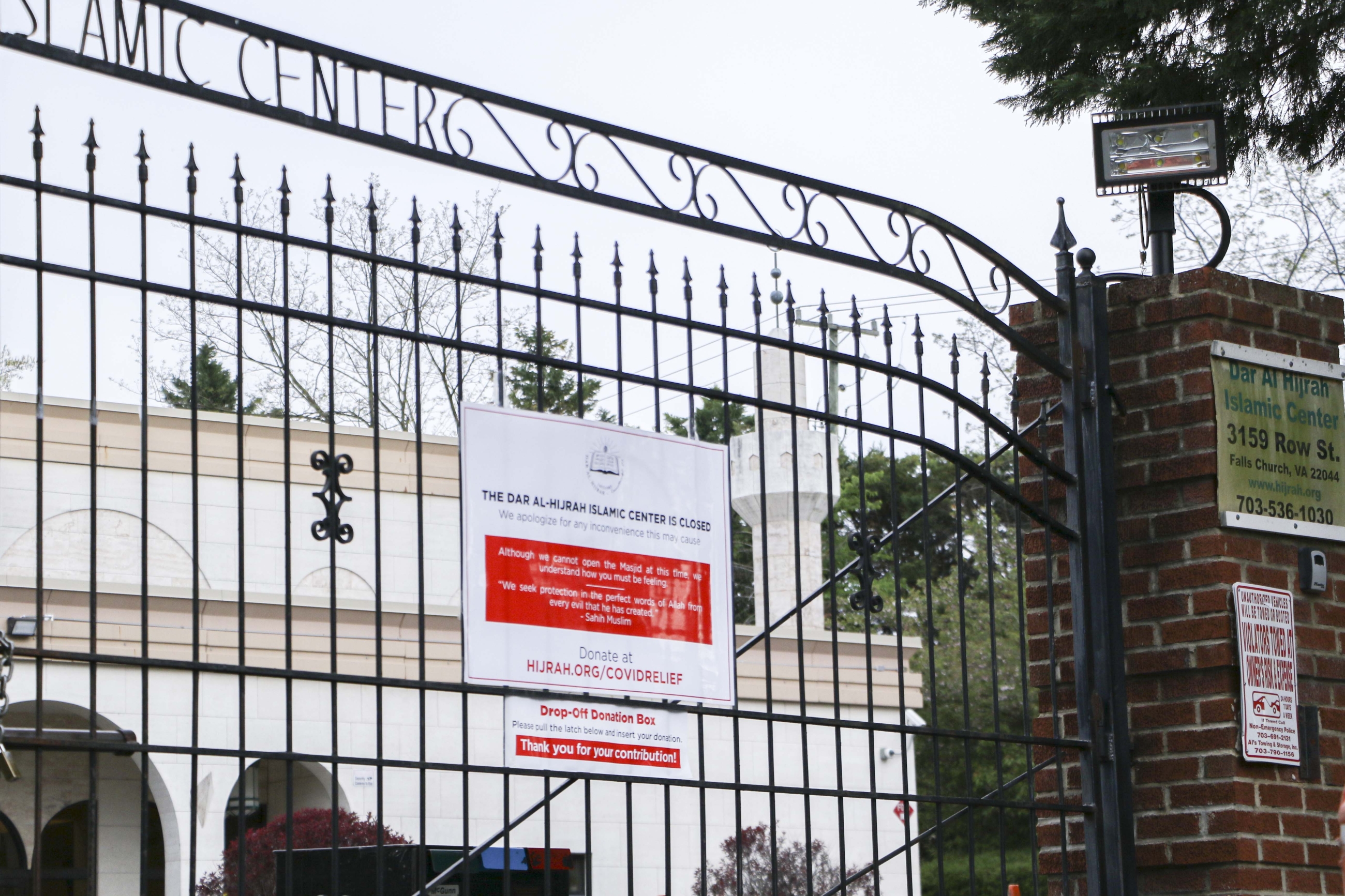
Imam Jamal Kakar has spent the last 20 years serving the needs of northern Virginia's Muslim community.
Before the coronavirus pandemic, he could usually be found at the Madina Islamic Center in Springfield, often wearing a neutral coloured shalwar kameez - a tunic-style top and loose pants - along with a dark vest and a traditional prayer cap, known as a kufi.
A towering and well-liked figure among Virginia's 170,000 Muslims, his efforts were crucial in obtaining the premises as a mosque and cultural centre.
But since early March, Kakar, like most other Americans, has been spending nearly all of his time at home.
The Madina Center, like most other mosques across the United States, has been forced to close as the nation endures its worst public-health crisis in a century.
New MEE newsletter: Jerusalem Dispatch
Sign up to get the latest insights and analysis on Israel-Palestine, alongside Turkey Unpacked and other MEE newsletters
Just as mosques have been unable to meet worshippers' spiritual needs, perhaps most painfully represented is the absence of Janazah, funeral prayers for those who have died. They also have faced their own unmet needs in the form of financial donations.
Kakar told Middle East Eye that the centre - an enclave for Pashtun immigrants mostly from Afghanistan as well as Pakistan - was struggling to pay its monthly lease and risked losing the space.
Before the shutdown, Kakar said the mosque was doing well, able to pay its monthly rent of $10,000, pay its staff, and also raise additional funds to secure a permanent home somewhere else down the line.
But since it closed its doors to help slow the spread of the coronavirus, it's also slammed shut its main sources of funding: in-person donations.
"We contacted the landlord but they are not showing any flexibility," Kakar told Middle East Eye.
"We hope and make dua (supplicate) that we don't lose the mosque because of an inability to cover our monthly expenses."
And with the Islamic holy month of Ramadan beginning this week, it will have to remain closed during a month that sees the highest amount of donations of the year.
'Financially uncertain time'
At the Islamic Center of Hawthorne just outside of Los Angeles, California, Jawdat Dajani told MEE that since his mosque had closed its doors, they had lost around 70 percent of their funding.
"What we're seeing is differently a drop - a severe drop - because physically people are not in the masjid (mosque)," said Dajani, who serves as president of the mosque's board of directors.
Hawthorne, California, is a medium to low-income area, with its median income being $47,636. The median income in the US is $61,937.
Dajani noted that since many of the worshippers are elderly and do not carry credit cards to the mosque, it's unlikely they would be able to contribute and donate money online.
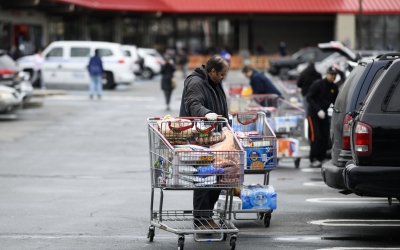
"We're hoping by the end of April, we'll have a better idea [of what we do]," he said.
While several small mosques said they expected they would be impacted by the prolonged closures, even some of the country's larger ones with more sophisticated funding streams have been deeply impacted.
For Dar al-Hijrah, one of the larger mosques in Northern Virginia, its monthly expenses run in the region of around $100,000.
Its funding comes from multiple sources, including in-person donations, grants from relief organisations, and donations from small businesses.
"It's a cascading event, essentially where your donors are suffering financially. And because they're suffering financially, they can't be as generous," Sayf Rahman, the government and public affairs director at Dar al-Hijrah, told Middle East Eye.
"So it's it's a very difficult situation to be in," Rahman said.
Stimulus funding
While many houses of worship, not just mosques, have been deeply impacted by the lockdown measures, the American government passed an emergency relief bill last month that gives loans to religious institutions that need it.
The bill, which gives out stimulus funding to small businesses, made available $350bn to small businesses, including houses of worship, which have faced financial hardship due to the coronavirus pandemic.
The bill even allows mosques that have not registered as 501(c)(3) non-profit organisations to qualify for the funding.
'We hope and make dua (supplicate) that we don't lose the mosque because of an inability to cover our monthly expenses'
- Imam Jamal Kakar
The Islamic Center of Greater Cincinnati, a large mosque in Ohio (ICGC), hasn't taken up the option but has instead been successful in transitioning most of its programmes online as it remains closed.
It's been able to retain its workforce and continue providing spiritual services as well as relief services for the greater community - such as its recent initiative to donate 1,000 face masks to local hospitals.
Still, Amir Azhar, the mosque board's chair, said despite all of this it was still facing a substantial decrease in donations.
"We try to give the message to the community that a lot of work is still being done and we need their support," Azhar told Middle East Eye.
"But at the same time, we all understand that a lot of people are losing jobs and it's a very financially uncertain time for people. So we don't want to be insensitive to their situations."
'Everybody is suffering'
Within the larger American Muslim community, four imams set up a crowdfunding initiative to help mosques across the US maintain staff.
So far, the campaign has raised more than $175,000 from individual donations and has received $162,500 in matching funds from Muslim relief agencies, totaling more than $330,000.
The initiative, spawned by imams Yasir Qadhi, Zaid Shakir, Omar Suleiman, and Suhaib Webb, will donate $5,000 to $10,000 in one-time grants to mosques in the US.
"The impact on our masjids/Islamic centres, and specifically our imams and staff members, is a source of pain for all of us," the campaign said on its fundraising site.
"This is not a matter that can be addressed by any one organisation."
Even with the available help to those mosques affected by the financial crisis caused by the pandemic, the faith institutions will take a huge financial hit as they must continue to shutter their doors ahead of the Islamic holy month of Ramadan - a period which sees the highest numbers when it comes to donations and fundraising.
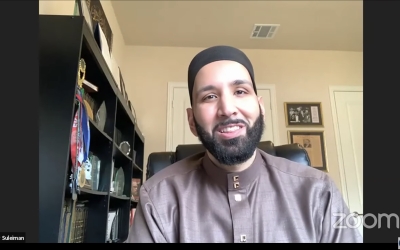
On the 27th night of the month, known in Arabic as Laylatul Qadr, many mosques partake in their biggest fundraiser of the year.
For some like the Madina Center in Virginia, the month helps to raise enough money to cover much of the yearly expenses.
"So we're thinking how will we be able to sustain for the coming several months now with the stay-at-home order until June. And it's going to be very difficult," Kakar said.
ICGC in Ohio and the Islamic Center of Hawthorne in California have said they plan to host virtual fundraisers for that night, since they cannot afford to miss out on the donations received - even if they will not be close to what they raised last year.
Hawthorne's Dajani noted that mosques should not push their communities too hard for funds since people are facing difficult financial circumstances.
"We understand people are worried. We are worried," Dajani said.
"I don't think we should push the community more than what they can because each one is dealing with his own problem these days.
"The same way we are suffering, everybody else is suffering."
Middle East Eye delivers independent and unrivalled coverage and analysis of the Middle East, North Africa and beyond. To learn more about republishing this content and the associated fees, please fill out this form. More about MEE can be found here.


